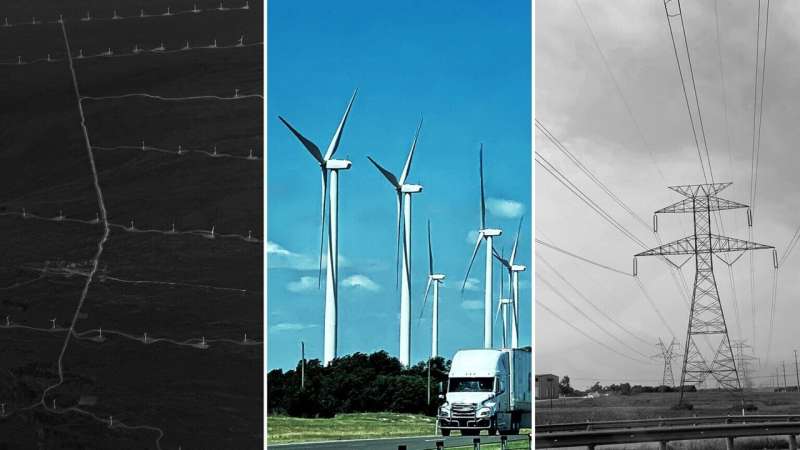This article has been reviewed according to Science X's editorial process and policies. Editors have highlighted the following attributes while ensuring the content's credibility:
fact-checked
peer-reviewed publication
trusted source
proofread
Pennsylvania policymakers underestimate public support for solar projects, survey says

Local elected officials surveyed in Pennsylvania underestimate their constituents' support for solar and other clean energy projects, according to a paper, "Public and Local Policymaker Preferences for Large-Scale Energy Project Characteristics," which was published August 1 in Nature Energy.
In their findings, based on survey responses from 894 Pennsylvanians and 206 policymakers from township, municipality, and county governments, the Princeton-led research team uncovered bipartisan support among Pennsylvanians for solar energy and other types of renewables when compared to a reference case of natural gas with carbon capture and storage.
But when local elected officials were asked about the types of energy projects they thought their constituents would support, the officials did not believe they would prefer other types of energy projects to natural gas.
This gap between actual and perceived support for clean energy projects suggests a need for clear and honest communication between the public and their locally elected representatives, said first author Holly Caggiano, who performed much of the research as a Distinguished Postdoctoral Fellow at the Andlinger Center for Energy and the Environment.
"The local official is so important to the energy transition," said Caggiano, now an assistant professor in climate justice and environmental planning at the University of British Columbia. "State and national governments might be setting climate and energy targets, but most project-specific decisions are made at the local level."
Without an open dialogue, Caggiano cautioned, local representatives might make decisions about energy projects they mistakenly think are the most popular among their constituents.
Research leader Elke Weber, the Gerhard R. Andlinger Professor in Energy and the Environment and professor of psychology and public affairs, also said the findings highlight an urgent need for more transparent and authentic public participation processes.
"Elected representatives ought to be able to—and responsible for—acting in the best interest of their constituents," said Weber.
"In future work, it would be interesting to explore the reasons for the mismatch we see in this work: are constituents not voicing their views sufficiently, or are the elected officials not hearing them? And what is the role of the media in correcting misperceptions of this type?"
In addition to asking about the type of energy projects they support, the researchers also asked Pennsylvanians about their preferences for different energy project ownership models.
Across the political spectrum, respondents expressed significantly less support for projects owned by foreign companies, while community-owned projects were the most popular.
Co-author Chris Greig, the Theodora D. and William H. Walton III Senior Research Scientist at the Andlinger Center for Energy and the Environment, said that significant co-ownership with local communities can be complex to execute for large-scale energy projects.
Rather, he wondered whether the high support for local ownership and lack of support for foreign ownership might reflect a historical lack of thoughtful engagement between developers, policymakers, and communities, which has eroded trust between stakeholder groups.
"Community members want to feel involved in decision-making about energy projects that impact them," said Greig.
"Developers should not come into communities with foregone plans to start putting in projects as fast as possible, but simply to explore opportunities that make sense to them and the community. There should be much greater emphasis on aligning and sharing benefits—community engagement should not be seen as merely a chore to be completed."
For example, the public expressed higher levels of support for energy projects that would create well-paying jobs for local community members, as well as for projects that would lower residents' energy bills.
Caggiano said the findings should encourage developers and policymakers to think creatively about other ways that energy projects can be an opportunity to provide benefits that improve the well-being of local communities.
"Community benefits are not merely a way to gain the necessary support to build more projects," Caggiano said. "They're an opportunity to think about how the energy transition can help to make people's lives better."
In fact, the team was recently selected for the U.S. Department of Energy's Solar Energy Evolution and Diffusion Studies 4 program to study community benefits agreements for large-scale solar projects.
Led by Weber, the researchers will examine how community benefits agreements can be reimagined to deliver tangible benefits to communities, build credibility in large-scale solar projects, and strengthen relationships and trust across stakeholder groups.
"If we expect communities to share in the disruption of the energy transition, then we really should be thinking about how they can also share in the benefits," Weber said.
"It's important for people to feel they have agency to advocate for the best benefits for them, and it is a disservice to everyone to present these issues as highly polarized when we actually see broad support for renewables."
While the researchers said studying energy preferences in Pennsylvania is especially interesting given its rich energy history, diversity of economic drivers, and position as a key swing state in federal elections, they emphasized that the values held by one community may not be held universally across different states and regions.
As such, they cautioned against trying to directly extrapolate the study's results to communities in other areas and instead underscored the importance of taking the time to understand and adapt to each community's needs through early and sustained dialogue.
"We may not always agree on the reasoning—some communities might want energy independence, some might want environmental protection, and others might want economic benefits—but I think we can all agree on the end goals," Weber said. "Ultimately, it's in everybody's interest to make our energy systems more sustainable and robust."
More information: Holly Caggiano et al, Public and local policymaker preferences for large-scale energy project characteristics, Nature Energy (2024). DOI: 10.1038/s41560-024-01603-w



















